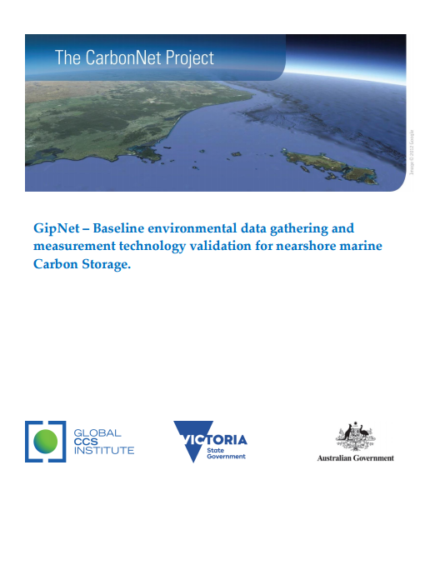Topic(s):
CO2 storage, CO2 transport
The Global CCS Institute is supporting the CarbonNet Project through the development of a series of knowledge share reports. The CarbonNet Project has completed its feasibility phase investigating the development of a hub-based network that will centre on a large capacity pipeline transporting CO2 to secure subsurface offshore storage sites, in Victoria, Australia. The Project's storage sites, for which permits have been obtained, have the capacity to store up to 5 million tonnes pa over 25 years in the nearshore shallow marine environment of the Gippsland Basin.
The measurement, monitoring, and verification (MMV) of the CO2 plume will be a standard procedure during the operation of any CCS project. Before monitoring of the plume commences, the natural environment prior to injection must be understood. Often this is achieved through baseline monitoring and requires the validation of techniques for the particular context. Baseline monitoring predominantly will focus on establishing what the conditions are like in the storage complex prior to injection. But the monitoring can also extend to measuring the natural variability of CO2 on the surface and near-surface around the storage site and recording the background geological conditions (eg. seismicity). Given the long time frames and normal variation in environmental and operating conditions during the lifespan of a CCS MMV program, it is critical that the technologies selected meet future operating requirements including regulatory requirements and stakeholder expectations.
This report reviews the practicalities of establishing three baseline measurement networks that span different aspects of the Gippsland nearshore environment:
•Seismicity,
•Atmospheric conditions, and
•Seafloor and water column conditions.
These networks will be deployed through the GipNet Program. The purpose of the Program is to validate thresholds for detection in the local environment, i.e. the nearshore shallow marine area in which CarbonNet's storage sites are located. This area is similar in many respects to other prospective storage basins globally. If successful the technologies could be used to undertake pre-injection baseline measurements and may form a component of the MMV program for the CarbonNet Project. The report details a five-year program, including the proposed technologies to be used and outlines the advantages and limitations of each technology. Importantly, the report describes the potential for the technology to determine whether stored CO2 is behaving as expected; this is a critical requirement for stakeholder assurance.
Download
Back to Publications
Disclaimer
The content within the Global CCS Institute Publications, Reports and Research Library is provided for information purposes only. We make every effort and take reasonable care to keep the content of this section up-to-date and error-free. However, we make no claim as to its accuracy, currency or reliability.
Content and material featured within this section of our website includes reports and research published by third parties. The content and material may include opinions and recommendations of third parties that do not reflect those held by the Global CCS Institute.
